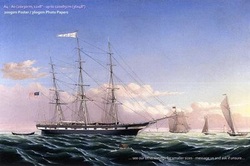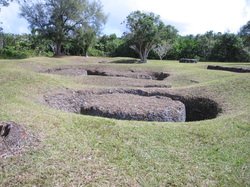PUBLIC PRESENTATIONS

Ethical Considerations in Genealogy
6 p.m. 21 August 2013, Hyatt Regency Guam, Tumon
Panelist include: Herman Guerrero, (NMI) Historian, Genealogist; Anthony Ramirez, Historian, Genealogist; Pale Eric Forbes,S.J. Genealogist; Monique Storie, PhD, Director, Micronesian Area Research Center and Evelyn Flores, PhD, University of Guam
___________________________________________________
CLICK HERE TO WATCH PRESENTATIONS
Genealogy is a record of the descent of a person, family, or group from an ancestor or ancestors. Our identity is first obtained from our family and sustained through family traditions and family history passed down to us by our elders.
Genealogy is a record of the descent of a person, family, or group from an ancestor or ancestors. Our identity is first obtained from our family and sustained through family traditions and family history passed down to us by our elders.
6 p.m. 21 August 2013, Hyatt Regency Guam, Tumon
Panelist include: Herman Guerrero, (NMI) Historian, Genealogist; Anthony Ramirez, Historian, Genealogist; Pale Eric Forbes,S.J. Genealogist; Monique Storie, PhD, Director, Micronesian Area Research Center and Evelyn Flores, PhD, University of Guam
___________________________________________________
CLICK HERE TO WATCH PRESENTATIONS
Genealogy is a record of the descent of a person, family, or group from an ancestor or ancestors. Our identity is first obtained from our family and sustained through family traditions and family history passed down to us by our elders.
Genealogy is a record of the descent of a person, family, or group from an ancestor or ancestors. Our identity is first obtained from our family and sustained through family traditions and family history passed down to us by our elders.
Genealogy is a record of the descent of a person, family, or group from an ancestor or ancestors. Our identity is first obtained from our family and sustained through family traditions and family history passed down to us by our elders.
In the process of “proving” a lineage, those conducting family history research can reveal information that has been purposefully suppressed by family members. With genetic genealogy we can now scientifically “prove” the ancestry and lineages of individuals. While this can open up new areas of inquiry it can also disprove long-held beliefs of ones identity. In some cases this can determine the future of a person by determining what opportunities are open to them.
In “Go ask you father: One Man’s Obsession with Finding his Origins through DNA testing” Lennard Davis recounts his journey after being told that his uncle was his biological father through artificial insemination. He was in denial for decades but when his uncle died he became obsessed with finding the truth. Along the way he had to deal with legal and ethical questions concerning the right to know and the right to privacy of both the living and the dead. Questions regarding the right to access information, the right to keep information private, the right to own and benefit from information or the right to security by controlling information. Ethical questions are usually thought of as between “right” and “wrong. ” Sometimes we find ethical questions between competing “rights.”
In the process of “proving” a lineage, those conducting family history research can reveal information that has been purposefully suppressed by family members. With genetic genealogy we can now scientifically “prove” the ancestry and lineages of individuals. While this can open up new areas of inquiry it can also disprove long-held beliefs of ones identity. In some cases this can determine the future of a person by determining what opportunities are open to them.
In “Go ask you father: One Man’s Obsession with Finding his Origins through DNA testing” Lennard Davis recounts his journey after being told that his uncle was his biological father through artificial insemination. He was in denial for decades but when his uncle died he became obsessed with finding the truth. Along the way he had to deal with legal and ethical questions concerning the right to know and the right to privacy of both the living and the dead. Questions regarding the right to access information, the right to keep information private, the right to own and benefit from information or the right to security by controlling information. Ethical questions are usually thought of as between “right” and “wrong. ” Sometimes we find ethical questions between competing “rights.”

INTERPRETATION OF HISTORY
2 p.m., 22 August 2013 CAHA Gallery, Hagåtña
Panelists include: Bal Aguon, MFA, filmmaker; Judy Flores, PhD, Scholar/artist; Michael Bevacqua, PhD, Scholar/artist
__________________________________________________
CLICK HERE TO WATCH PRESENTATIONS
History is susceptible to manipulation and distortion. When used responsibly it can help us to understand why we think and react in certain ways and assist us in planning the future. But many times history is interpreted and delivered through the lens of the teller and their prejudices. “Collective Memory” is many times shaped by sometimes false and incomplete history. Leaders have been known to suppress history or used incomplete, on-sided or false history to achieve their goals. In some cases the goal may be to build solidarity and pride, or to hold on to myths that have been perpetuated through time. Sometimes history is used to recount past atrocities in order to seek redress and used to treat others badly such as seizing property, persecuting and killing others. History is also abused when people ignore or suppress evidence that might challenge a preferred view of the past. Artists and filmmakers interpret history for the general public. What role do they play in shaping this collective memory? Do they have a responsibility to portray history accurately?
2 p.m., 22 August 2013 CAHA Gallery, Hagåtña
Panelists include: Bal Aguon, MFA, filmmaker; Judy Flores, PhD, Scholar/artist; Michael Bevacqua, PhD, Scholar/artist
__________________________________________________
CLICK HERE TO WATCH PRESENTATIONS
History is susceptible to manipulation and distortion. When used responsibly it can help us to understand why we think and react in certain ways and assist us in planning the future. But many times history is interpreted and delivered through the lens of the teller and their prejudices. “Collective Memory” is many times shaped by sometimes false and incomplete history. Leaders have been known to suppress history or used incomplete, on-sided or false history to achieve their goals. In some cases the goal may be to build solidarity and pride, or to hold on to myths that have been perpetuated through time. Sometimes history is used to recount past atrocities in order to seek redress and used to treat others badly such as seizing property, persecuting and killing others. History is also abused when people ignore or suppress evidence that might challenge a preferred view of the past. Artists and filmmakers interpret history for the general public. What role do they play in shaping this collective memory? Do they have a responsibility to portray history accurately?

HISTORY AND IDENTITY
6 p.m. 23 August 2013 CLASS Lecture Hall, University of Guam
Panelists include: Robert Underwood, PhD, President, University of Guam; Carlos Madrid, PhD, Researcher, Historian; Anthony Ramirez, Historian, Genealogist, David Atienza, PhD, Assistant Professor, Anthropologist
__________________________________________________
CLICK HERE TO WATCH PRESENTATIONS
“It can be dangerous to question the stories people tell about themselves because so much of our identity is both shaped by and bound up with our history. That is why dealing with the past, in deciding on which version we want, or on what we want to remember and to forget, can become so politically charged.” ~Margaret McMillian in “The Use and Abuse of History”
Our identity is obtained from the communities that we are born into and those we choose to be a member of. These communities can be based on a variety of things such as sex, age, gender, ethnicity, social status, geography, nationality, religion, clan, family, occupation, culture and so on. The boundaries of these communities can change with time and identity is an ongoing process. For example, teenagers were virtually unknown prior to the 1900s. There were only children and adults. Now we not only have teenagers but pre-teens now called “tweens,” toddlers and so on. Once we were Americans, now we are African-Americans, Hispanic Americans, and Jewish-Americans etc.
If we are a part of a group, it implies that we have a shared history and that we are part of something larger that is more enduring than ourselves. It is comforting and gives us models for our behavior. We are taught to act a certain way to conform to the beliefs of the group. In some groups women must be meek and submissive, in others outsiders are not to be trusted, in some we cannot marry outside the group.
Author and scholar, Benedict Anderson coined the term “imagined community” for groups that are so large that one can never know all the members, yet can still draw loyalty from members. An example would be religions, nations or ethnicities. These imagined communities mark their identities with symbols, such as flags, songs, chants and specific clothing. History is a way of enforcing the “imagined community” and plays a part in the creating a sense of cohesiveness for members. Celebratory in nature, these histories are usually one-sided or simplistic. Creative license with songs, poems and stories that perpetuate these histories often serves to immortalize incorrect information transforming history into myth.
6 p.m. 23 August 2013 CLASS Lecture Hall, University of Guam
Panelists include: Robert Underwood, PhD, President, University of Guam; Carlos Madrid, PhD, Researcher, Historian; Anthony Ramirez, Historian, Genealogist, David Atienza, PhD, Assistant Professor, Anthropologist
__________________________________________________
CLICK HERE TO WATCH PRESENTATIONS
“It can be dangerous to question the stories people tell about themselves because so much of our identity is both shaped by and bound up with our history. That is why dealing with the past, in deciding on which version we want, or on what we want to remember and to forget, can become so politically charged.” ~Margaret McMillian in “The Use and Abuse of History”
Our identity is obtained from the communities that we are born into and those we choose to be a member of. These communities can be based on a variety of things such as sex, age, gender, ethnicity, social status, geography, nationality, religion, clan, family, occupation, culture and so on. The boundaries of these communities can change with time and identity is an ongoing process. For example, teenagers were virtually unknown prior to the 1900s. There were only children and adults. Now we not only have teenagers but pre-teens now called “tweens,” toddlers and so on. Once we were Americans, now we are African-Americans, Hispanic Americans, and Jewish-Americans etc.
If we are a part of a group, it implies that we have a shared history and that we are part of something larger that is more enduring than ourselves. It is comforting and gives us models for our behavior. We are taught to act a certain way to conform to the beliefs of the group. In some groups women must be meek and submissive, in others outsiders are not to be trusted, in some we cannot marry outside the group.
Author and scholar, Benedict Anderson coined the term “imagined community” for groups that are so large that one can never know all the members, yet can still draw loyalty from members. An example would be religions, nations or ethnicities. These imagined communities mark their identities with symbols, such as flags, songs, chants and specific clothing. History is a way of enforcing the “imagined community” and plays a part in the creating a sense of cohesiveness for members. Celebratory in nature, these histories are usually one-sided or simplistic. Creative license with songs, poems and stories that perpetuate these histories often serves to immortalize incorrect information transforming history into myth.